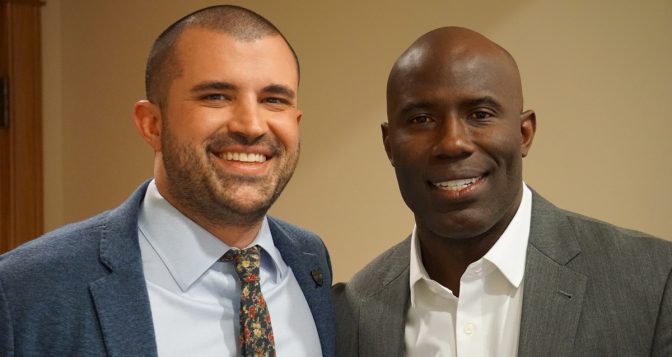NFL Hall of Famer Speaks Out at Cannabis Opportunity Summit


MCBA board chair Kayvan Khalatbari and NFL Hall of Famer Terrell Davis at the Cannabis Opportunity Summit in Denver on March 23. (Photo by Wally Wallace)
Former NFL running back and Denver sports legend Terrell Davis showed off the Hall of Fame ring he received in 2017 to a crowd of 500 attendees at the Minority Cannabis Business Association’s Cannabis Opportunity Summit on March 23 at the University of Denver.
The Broncos’ all-time leading rusher doesn’t use marijuana for pain or any other lingering condition. But he remembers how the arrests of mostly young black men for marijuana damaged their lives when he grew up in San Diego. Davis thinks it’s time to change that cycle, and sees the development of minority-owned cannabis businesses as one way to accomplish that.
“As minorities, we’re always underdogs,” he pointed out. “We’ve always been labeled ‘can’t do it.’ That’s all we heard growing up. I’ve heard that since I was seven years old. That’s what you guys are now. You’re the underdogs. Embrace it. Take chances. It’s a risky business, and you take the risks. I like that.”
Lawrence Grandpe: «When one-fifth of the workforce is in jail, your community doesn’t have the ability to succeed.”
The summit was the brainchild of Kayvan Khalatbari, an Iranian-American entrepreneur who cofounded Denver Relief, Colorado’s second-oldest medical-marijuana dispensary. He’s also chair of the MCBA’s board and is running for mayor of Denver in the 2019 election. After 13 years in the cannabis industry, Khalatbari’s concerned about white males dominating it. “In new states where you see a very limited number of licenses and such a high barrier of entry, marginalized people can’t play, no matter what color they are,” he told Freedom Leaf.
The number of minorities in the cannabis business nationwide is estimated at 10-18%. However, in Colorado, it may be as low as 1%. “This is a state that is supposed to have one of the lower barriers of entry,” Khalatbari notes. “I know that things move slowly, especially in conversations of race and cannabis. But I’d be happy with this being part of every conversation and every possible legislation and regulation that has to do with cannabis implementation. We want this to be a better industry. That is kind of MCBA’s mission, which is that we can learn the lessons of other industries and make this one different.”
MCBA President Shanita Penny—she took over for Jesce Horton, who resigned Jan. 8, after serving as vice president—previously worked as a project leader in the information technology industry. “The MCBA is an opportunity for a community that has specifically been negatively impacted by prohibition to have an opportunity to create generational wealth,” she told Freedom Leaf. “That’s something that we haven’t been able to do. Now we’re creating something that is going to be handed down for generations.”
Diversity, Penny added, is needed in different types of jobs in cannabis, such as testing, transportation and other ancillary businesses. “Not everyone can afford to spend $18 million for a state-of-the-art 100,000-square-foot facility,” she explained.
The Summit peaked on March 23 with 43 speakers—many of them top names in the industry—featured in breakout sessions that focused on market opportunities, cultural integration, community impact and activism.
MCBA President Shanita Penny: “Not everyone can afford to spend $18 million for a state-of-the-art 100,000-square-foot facility.»
Lawrence Grandpre, director of research for the Baltimore-based Leaders of a Beautiful Struggle, a grass-roots think tank that became known for organizing against police brutality and continues working to restore a community decimated by the War on Drugs, told the crowd: «We work with workforce development and community economic development and we had some ideas about what could work for targeted interventions in the communities most impacted by the War on Drugs. But they always say, ‘Where’s the revenue?’ If we had the legalization of recreational marijuana, there would be a pool of tax revenue that could go to a lot of worthy causes, like schools or even the police.
“When you’re under the constant assault, your community has a hard time flourishing,» he added. «When one-fifth of the workforce is in jail, your community doesn’t have the ability to succeed.”
MCBA has created a model adult-use bill in cooperation with Students for Sensible Drug Policy, the Cannabis Culture Association and the Drug Policy Alliance (all of whom were represented at the summit) and supports Sen. Cory Booker’s Marijuana Justice Act.
Khalatbari thinks that some of what’s been created in regulated markets doesn’t appeal to people of color. “They feel uncomfortable and excluded,” he says. “The MCBA is an attempt to bring them back into the fold. This is about MCBA being a steward of people of color.”
Related Articles
Freedom Leaf’s Diversity Impact List
How Cannabis Activists Derailed Roger Stone
If you enjoyed this Freedom Leaf article, subscribe to the magazine today!
